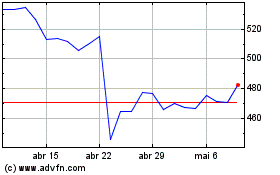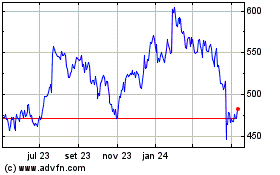SHANGHAI—Where Pakistan has succeeded, China has once again
failed.
MSCI Inc.'s decision not to include Chinese stocks listed on the
mainland in its key Emerging Markets index, tracked by $1.5
trillion of funds world-wide, comes despite rushed efforts by
Beijing in recent weeks to show its markets are now reformed enough
to merit inclusion, following two previous rejections since
2014.
In a statement accompanying its verdictâ "delivered as MSCI also
said it would admit Pakistani stocks to the index for the first
time—the index provider pointed to a key remaining issue for
investors when it comes to Chinese markets: their ability to get
money in and out of the country without limits.
Despite some opening up in recent years, Beijing remains
reluctant to allow capital to flow freely across its borders. While
the government is happy for more foreign money to flow into Chinese
stocks, it is wary of rapid outflows when trouble hits.
"I'm very happy that MSCI called it out," said Karen Wong, head
of equity portfolio management at Mellon Capital Management. "They
[the Chinese authorities] have probably only done half of what MSCI
has asked for," she said.
Ms. Wong said the fact that each month investors are only able
to repatriate an amount equivalent to up to 20% of the assets they
held in China at the prior year-end means it could be hard to get
money out of the country in a crisis.
"The market is probably OK unless you have people running for
liquidity," she said. "Then there can be a cascading domino effect.
We saw it less than 10 years ago during the global financial
crisis," she said.
Despite such key reservations among big foreign fund managers,
many analysts outside China had expected MSCI to give A shares the
nod this time. Goldman Sachs had said there was a 70% chance A
shares would be included before the decision. Its China strategist
Kinger Lau said Wednesday the non-inclusion was a "surprise."
Guillaume Derville, head of Asia Equity and Derivative Strategy
at BNP Paribas, said MSCI's decision was "somewhat disappointing",
adding that Chinese regulators had addressed many of investors'
concerns in the past year.
By contrast, Chinese investors seem to have anticipated the
news. Disillusionment with stock investing has grown within China
in recent months after a tumultuous 2015, during which stocks first
surged 43% before plunging sharply.
Trading volumes have slumped in recent weeks with trading
largely flat, although shares in Shanghai rose 1.5% at the midday
break Wednesday after the MSCI announcement—a contrast to the slump
in Chinese shares that followed MSCI's decision a year ago not
include them in its indexes.
"As long as China's stock market remains one where the regulator
acts like a parent and retail investors behave like kids, and
everyone still expects the government to bail out a crashing
market, it won't meet MSCI's criteria," said Shen Meng, director at
Chanson & Co., a Beijing-based boutique investment-bank.
"China will always have a tightly managed system. If you allow
rapid and massive capital inflows or outflows, our market will also
suffer from very sharp swings," said Mr. Shen.
The China Securities Regulatory Commission said that any
international index without A shares is incomplete and that its
domestic equities market is gaining international influence.
A Chinese official close to the agency said that in the past few
months, there has been "lots of interaction" between the agency and
MSCI, adding that the agency has "done a lot" to try to meet the
MSCI's demands.
Late last month, for example, the CSRC introduced new guidelines
aimed at limiting the frequency with which Chinese companies
indefinitely suspend their shares from trading.
Still, regulators' top priority for the market has been
maintaining its relative stability over the past few months. Under
the new CSRC chairman, Liu Shiyu, the agency has been slow to push
through other reforms such as establishing a more market-oriented
system for initial public offerings and has instead emphasized
"caution," officials close to the agency said.
A long-planned trading link between Hong Kong and the Shenzhen
market which would allow foreign investors more opportunity to
trade on the mainland is still yet to be launched.
Mr. Liu replaced the beleaguered Xiao Gang in February, who was
fired from the post by the leadership following a $5 trillion
stock-market rout last summer and a botched market-rescue
effort.
Given the current political emphasis on stemming capital
outflows, China isn't likely to soon lift the restrictions on
foreign investors redeeming their stock investments in China as
called for by the MSCI.
"That's not up to the CSRC alone," said the official close to
the agency.
For many others in China, the latest knock back from the MSCI
could yet prove water off a duck's back.
"When Deng Xiaoping died in 1997, the Shanghai market opened
lower by 100 points but then swiftly resumed moving on its own
trajectory rather than crashing further," said 64-year-old retail
investor Ma Zhigang, a retired worker from Shanghai.
"It's not surprising that MSCI said no again, because China's
stock market remains highly speculative," Mr. Ma said. "If China
opens a casino, it will be the world's biggest one," he added.
Lingling Wei, Yifan Xie and Chao Deng contributed to this
article.
Write to Shen Hong at hong.shen@wsj.com
(END) Dow Jones Newswires
June 15, 2016 04:15 ET (08:15 GMT)
Copyright (c) 2016 Dow Jones & Company, Inc.
MSCI (NYSE:MSCI)
Gráfico Histórico do Ativo
De Jun 2024 até Jul 2024

MSCI (NYSE:MSCI)
Gráfico Histórico do Ativo
De Jul 2023 até Jul 2024
